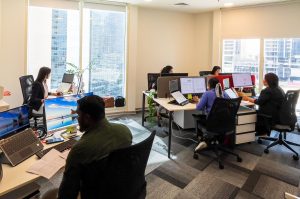You’ll find start-up companies in home offices and co-working spaces across almost every country in the world. In fact, there are three new start-ups every second of every day. But what exactly is a start-up?
The term was first used way back in the 1970s. It then came into popular usage during the dotcom bubble of the 1990s.
Now it’s a term we associate with start-up successes like Facebook and Uber as well as newer enterprises on the scene. And it’s a term that we always tend to link with technology.
However, LinkedIn’s 2019 list of fast growing start-ups features companies providing fashion and fitness classes as well as computer software and online financial services.
It’s clear that start-ups cover a wide range of industries. So what do all of these start-up companies have in common?
What is a Start Up?
A start-up is… a company in its early stages
According to the Cambridge English Dictionary, a start-up is “a small business that has just been started”.
To put a number on it, a start-up might have been in operation for anything from a few days to five years.
You also come across companies older than this claiming to maintain a “start-up mentality”. That basically means that despite their growing size and profits, they still strive to be innovative and flexible.
A start-up is… often funded by an alternative source of investment
The majority of start-up founders don’t look to the banks for their initial capital. In fact, 77% of start-ups are first funded through the personal savings of the founder or founders.
Other start-ups have found the funding they needed through crowdfunding websites. Kickstarter (an innovative start-up in its own right, once upon a time) is one of the more popular.
A start-up is…a company that tries to solve a problem
Start-ups look to solve an existing problem with innovation. Start-ups bring a new product, service or platform to the market. This means there is no guarantee of success and there’s no blueprint already in place.
A start-up is…a company that aims to move and scale quickly
A start-up is lean enough to make decisions and implement changes quickly. It’s also structured to grow quickly, with operations able to scale in a very short space of time.
A start-up is… a company whose founders call the shots
Start-up founders are in complete control of their business. They haven’t been bought out or acquired by other organisations (although that may be a longer term ambition).
A start-up is…an exciting place to work
Working closely with the founders. Having a real impact on the direction of the company. Getting the opportunity to innovate.
These are just some of the reasons why an employee might choose to work within a small start-up team. And why they’re happy to accept the unexceptional salary and significant instability that often goes with the job.
It doesn’t get much more exciting than working at a start-up.
A start-up is…a company with a global outlook
You’d never class a neighbourhood bookshop or a local franchise as a start-up. Whilst these companies may be newly formed, they probably don’t have the global outlook characteristic of start-up enterprises.
Start-ups always have an idea that can be applied and marketed to an international audience. And they also have the tech know-how that enables them to reach that audience.
As a start-up company grows beyond these characteristics, it loses its start-up status. Big successes like Facebook and Airbnb become “unicorns” (start-ups worth over $1billion).
And more modest (but nonetheless well-deserved) success is found by start-up companies every day, meaning they can employ more staff, open more offices and generate more profit.
If you’re a start-up owner looking to move beyond your home office, check out Workinton co-working spaces. We provide a happy home for innovative and enterprising start-ups, just like yours.




































